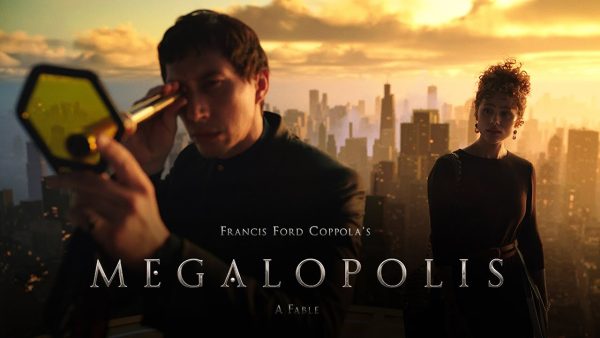
When I saw the trailer for “Megalopolis” a few weeks ago, I was excited. With an ensemble cast featuring Adam Driver, Giancarlo Esposito and Laurence Fishburne, I was optimistic that the film would resonate with me. At its core, “Megalopolis” wants to be a film about the importance of hope and how we need to make the world better for future generations.
When I left the theater after watching what has been called Francis Ford Coppola’s magnum opus, my first thought was that I needed a nap.
I’ll start with the good, though there wasn’t much to be found. Visually and sonically, this movie was stunning. Coppola spent $120 million of his own money to finance his 40-year-long passion project. If nothing else, that money went toward a beautiful set. Many movies that have come out in the last couple of years have been visually dull. “Megalopolis” was anything but. Most scenes were cast in a golden light, making the movie feel ethereal and futuristic in a way that transported me to the fictional city of New Rome.
The score, written by Osvaldo Golijov, added a necessary lightness to a lot of scenes in what was otherwise a very dense film. Grace VanderWaal also wrote two original songs for the movie, which are listed on Spotify under her character’s name, Vesta Sweetwater.
The only other enjoyable element was the movie’s use of newspaper headlines to further the narrative and provide background information. It felt fresh and interesting in a way that the movie on the whole was not. The dialogue was awkward at best, and the plot was somehow doing too much and nothing at all. Adam Driver’s Cesar Catalina and Giancarlo Esposito’s Franklyn Cicero were supposed to be ideological rivals who disagreed about the future of New Rome, but they interacted maybe three times over the course of the movie. The audience is told that they have some complicated history, but it’s lackluster. Ultimately, we are told a lot more than we are shown. I am not trying to insult Driver’s or Esposito’s performances; they really did the best they could with an awful script. This film was an insult to their acting.
In fact, only one performance stood out to me: Shia LaBeouf’s performance as the insufferable gremlin, Clodio Pulcher. I was shocked to see him in the trailer; apparently, Coppola purposefully cast him along with a couple of other controversial stars to avoid the film being deemed “some woke Hollywood production.” Whatever Coppola’s reasons for casting LaBeouf, he has still been accused of sexual battery, assault and infliction of emotional distress by his former partner, singer FKA Twigs. I guess if you’re funding your whole self-insert vanity project, anything goes.
I could go on and on about the female characters as well. Somehow, the movie passed the Bechdel test, which measures female representation in media by asking if two named female characters interact and discuss something other than a man — but barely. Despite that, every single female character was criminally underdeveloped. Nathalie Emmanuel’s character only existed in an attempt to make Cesar Catalina more sympathetic; Aubrey Plaza had potential as a femme fatale, but Coppola focused far more on her character’s sexual relationships than any real development; and VanderWaal’s character, who is a pop-star-meets-Vestal-Virgin, finds herself performing at a wedding where her virginity is literally auctioned off and then embarrassed when a deepfake of her sleeping with Cesar Catalina is leaked mid-performance. Come on.
Coppola’s intention to tell a story about the importance of hope and leaving the world better than we found it is admirable, but his execution left much to be desired. “Megalopolis” feels like a shameless Oscar grab instead of a true labor of love. It was overambitious to a fault and forewent meaningful dialogue in favor of half-hearted melodrama, failing to appeal to older generations and younger generations alike.
I feel vindicated knowing that it bombed at the box office. I wasted nearly two and a half hours of my life; Coppola wasted $120 million.



Leave a Comment